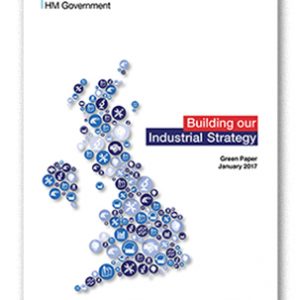- Home
- Government launches industrial strategy
Government launches industrial strategy

The government has published its industrial strategy white paper, which it says will improve living standards and economic growth by increasing productivity and driving growth across the whole country.
The strategy focuses on five key “foundations” of productivity: ideas, people, infrastructure, business environment and places and pledges the creation of an independent watchdog to monitor progress in innovation, as well as increasing the level of workplace skills. The government also plans to set up long-term strategic deals in four sectors seen as having growth potential: construction, life sciences, automotive and artificial intelligence.
The strategy was consulted on earlier this year, following the publication of the green paper, which, among other things, pledged £170 million for new institutes of technology. The white paper includes several announcements already made, with a few new additions, as part of the drive to create “a technical education system that rivals the best in the world to stand alongside our world-class higher education system”.
Industrial strategies announcements
- The government will update school and college performance measures “to ensure that students can make an informed choice between technical or academic education in time for the introduction of the first T levels, recognising them as equally valued routes”.
- An £8.5 million pilot will test “innovative approaches to improve outcomes in basic maths for those aged 16 and over”. The report cites the fact that only around 17.5 per cent of young people who have not achieved a “good standard of maths” by 16 go on to do so by 19 under the GCSE resits policy, which the document says government will “continue to monitor and review”. The government will also invest £40 million to establish “Further Education Centres of Excellence across the country to build teaching capacity and spread best practice”.
- The report includes a few more details of the “national retraining scheme”, outlined last week, which it says will be introduced by the end of the current Parliament. “A high-level advisory group - the national retraining partnership - will bring together the government, businesses and workers, through the Confederation of British Industry and the Trades Union Congress, to set the strategic direction and oversee implementation of the scheme.
 The national retraining scheme will be informed by £40 million announced in the spring budget to test innovative approaches to helping adults up-skill and re-skill. The pilots will help us learn more about how to support and incentivise adults to learn skills that will help them, their local economies and national productivity.” The £64 million scheme, due to start next year, will initially target skills shortages in key sectors, such as digital and construction.
The national retraining scheme will be informed by £40 million announced in the spring budget to test innovative approaches to helping adults up-skill and re-skill. The pilots will help us learn more about how to support and incentivise adults to learn skills that will help them, their local economies and national productivity.” The £64 million scheme, due to start next year, will initially target skills shortages in key sectors, such as digital and construction. - In total, the report states that the government will spend “an additional £406 million in maths, digital and technical education, helping to address the shortage of science, technology, engineering and maths (Stem) skills”.
- The report also reiterates plans to devolve the adult education budget to mayoral areas in 2019.
- Government will invest “up to £20 million” in 2018-19 and 2019-20 to “help further education colleges develop the skills of their staff to deliver [T levels]”. It will also host a major “Skills Summit” with leading employers and publish a public consultation on the detailed design and delivery of T levels “before the end of the year”.
- A call for proposals for the first institutes of technology will be published “shortly”.
‘Vital piece in the jigsaw’
Prime minister Theresa May said: “Our modern industrial strategy will shape a stronger and fairer economy for decades to come. It will help create the conditions where successful businesses can emerge and grow, and support these businesses in seizing the big opportunities of our time, such as artificial intelligence and big data, whilst also making sure our young people have the skills to take on the high-paid, high-skilled jobs this creates.”
Mark Dawe, chief executive of the Association of Employment and Learning Providers, said: “The industrial strategy is a vital piece in the jigsaw of future UK prosperity. Without the availability of a skilled workforce it will fall at the first hurdle - therefore proper investment and implementation of the current skills policies, combined with further targeted investment, must remain a government priority.”
And David Hughes, chief executive of the Association of Colleges (AoC), said it was right that the government placed skills at the forefront of the industrial strategy. “Following our decision to leave the European Union, the economic success of our country depends on using the talents and abilities of all our people - colleges are central to this,” he said, adding: “As a country, we need to ensure that young people and adults have skills which will allow them to improve productivity, cope with enormous technological change and deal with the uncertainties of modern life. We welcome the government’s aim to develop a technical education system that rivials others in the world. Visitors from other governments to UK colleges are often impressed by their capability so there are firm foundations for this.”
Mr Hughes said the initiatives already announced in the budget last week and confirmed by the industrial strategy were “a good start and a helpful statement of intent from government but more will need to be done to ensure the different initiatives work well together and to provide the predictability that allows colleges to make their own investments in staff and facilities”.
Want to keep up with the latest education news and opinion? Follow Tes FE News on Twitter, like us on Facebook and follow us on LinkedIn
Keep reading for just £1 per month
You've reached your limit of free articles this month. Subscribe for £1 per month for three months and get:
- Unlimited access to all Tes magazine content
- Exclusive subscriber-only stories
- Award-winning email newsletters



